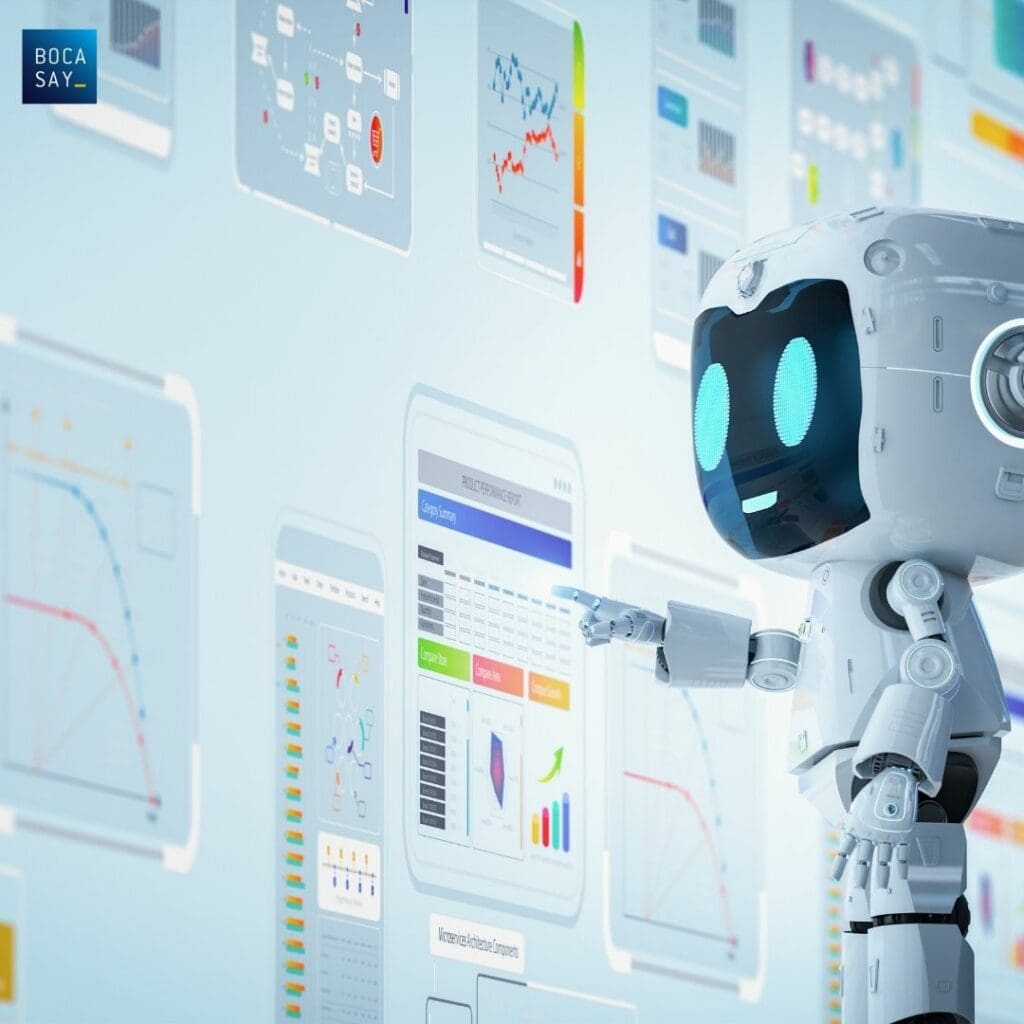What are the uses of AI in companies in 2025?

Automate, optimize, produce content, or even anticipate the future , what does AI situates itself have in businesses in 2025?
Key takeaways :
| 1 | The use of generative AI within companies is increasing exponentially. |
| 2 | AI is used because it improves processes, helps reduce costs, and enhances work quality. |
| 3 | There are 4 identified use cases of AI in companies:– Optimization AI– Automation AI– Content creation and generation AI– Analysis and prediction AI |
| 4 | AI analyses are highly dependent on the quality of the dataset on which they rely. If the data is flawed, the AI’s responses will be affected. |
The Rise of generative AI solutions and the explosion of use cases
A study by the Observatoire des métiers du numérique, de l’ingénierie, du conseil et de l’événement (OPIIEC) was conducted in 2024. It focuses on skill needs, jobs, and training related to artificial intelligence in France. The research spans multiple sectors: digital, engineering, consulting, and events.
As you might expect, the use of AI within companies has evolved exponentially. According to the Institut français d’opinion publique (IFOP), the number of people using AI increased by 60% between 2023 and 2024. It is very likely that in 2025, this trend continues, possibly at an even faster pace.
In many cases, generative AI, which creates new data by mimicking humans, is first used by employees without upper management being aware. These uses are neither approved nor forbidden by IT departments, but they exist and are initiated by employees.
For more, check out our article: The AI Revolution: Transforming Work and Companies
With only a few short years of hindsight, we can already see that AI brings several advantages.
AI Improves processes
Intellectual tasks can be automated using generative AI (e.g., starting from source code, AI can automatically generate unit tests).
AI Helps reduce costs
According to a Capgemini study, the mass adoption of generative AI could reduce companies’ operational costs by 25% to 35% by the end of 2025.
AI Increases work quality
As a daily assistant for time-consuming or low-value-added tasks, AI provides an opportunity for workers to boost creativity and decision-making. AI tends to enhance more singular human skills.
Moreover, it is noticeable that general-purpose solutions are used more than specialized, customizable AI tools. By general-purpose AI, we refer to ChatGPT, NotionAI, or Copilot for code suggestions. As for specialized AI, this includes pre-trained models like Hugging Face Transformers, LangChain, or AutoML. We’ll see how this trend evolves over the next few years…
“By freeing the mind from low-value tasks, AI opens the way to ‘higher’, better quality, and more intuitive thinking.”
Let’s now explore the use cases of AI in businesses
Usage arises from the benefits that organizations can derive from AI. The use cases are divided into four categories.
AI use cases in companies
Optimization AI
Optimization AIs aim to improve a specific element (budget, time, resources…). These are widespread across many industries. The goal is to find the best possible solution to an unresolved problem, often considering multiple constraints.
As an offshore web agency, we find this AI use case very useful for:
- Optimizing resources on a web project by allocating tasks and planning development sprints.
- Reducing technical debt or refactoring code.
- Optimizing technical choices by selecting the best libraries.
- Anticipating bugs.
- Generating documentation.
The scope is wide and virtually limitless.
“Optimization AI is the art of choosing the best of the impossible.”
However, one must remember that effective AI-powered optimization is only possible if based on high-quality data. This is the condition for reliable results.
Automation AI
Automation AIs aim to manage complex or repetitive tasks , or those requiring human intervention , automatically. The goal is to reduce errors and free up time for higher-value actions.
Adopting automation AI for part of your activity means trusting an artificial assistant that isn’t perfect but makes fewer mistakes than a human under pressure.
If an AI has a 10% error rate in detecting network anomalies (for example), compared to a human’s 35% rate, then yes , AI offers real added value. Automating such operations would benefit the company.
Some companies still hesitate to adopt these processes due to the significant changes involved. Fears stem from concerns that AI might make poor decisions, a lack of trust in algorithms, or an underestimation of automation’s benefits , not to mention job losses.
“Artificial intelligence helps human intelligence go further, without replacing it , with more precision, and perhaps even a bit of lightness.”
Content creation and generation AI
These AIs draw from their databases and datasets to generate content such as text, images, music, or videos.
Content-generating AI boosts the creative capacity and productivity of content creators. However, ethical, legal, and data security issues must be considered.
The emergence of deepfakes involving Emmanuel Macron or Pope Francis is disturbing. These artificial videos are illegal and can have serious consequences by spreading false information.
Analysis and prediction AI
The final use case explored here: analysis and prediction AIs. These are especially useful in software application maintenance. From large datasets, they extract insights and can predict future events. Their forecasts are highly valuable for decision-making.
Such predictions have a major impact in financial markets, healthcare, or meteorology.
To learn more about this topic, see our article on the application of AI in different types of maintenance.
As mentioned earlier, AI-generated probabilities are deeply tied to the quality of their datasets. Errors in data will lead to flawed predictions.
Looking for guidance on how to implement AI in a structured and secure way within your organization? Contact our offshore web agency.
References
Report by the Observatoire des métiers du Numérique, de l’Ingénierie, du Conseil et de l’Événement (OPIIEC): Skill needs, jobs, and training in artificial intelligence in France